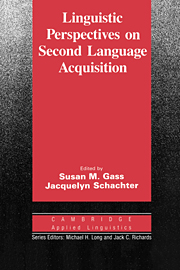I - THEORIES OF ACQUISITION
Published online by Cambridge University Press: 05 October 2012
Summary
The two chapters in this section deal with the relationship of second language acquisition to a theory of language. The first chapter, by Kevin Gregg, is concerned with general issues of that relationship, whereas the chapter by Robert Bley-Vroman takes a specific theory of language (Universal Grammar [UG]) and examines it within the context of second language learning.
Gregg's chapter looks at traditional concepts in the second language literature. Specifically, he points out that we must have a clear idea of the domain of inquiry of second language acquisition before attempting to construct a theory of it. He argues from a Chomskyan perspective that in characterizing second language knowledge, as in characterizing primary language knowledge, it is necessary to differentiate between competence and performance. Competence is the knowledge that we have about our language, knowledge which goes beyond what we produce, to include the recognition of ambiguities, ungrammatical utterances, and so forth. Thus, while as native speakers of English we know that a sentence such as “I saw the man that you met yesterday” is grammatical and are freely able to produce it, we also know that a sentence such as “I saw the man that you met him yesterday” is not standard English. Information about grammatical and ungrammatical sentences is included in what is called grammatical competence. Performance, on the other hand, refers to what we actually produce, or our linguistic behavior, and can be more closely aligned to ability.
- Type
- Chapter
- Information
- Linguistic Perspectives on Second Language Acquisition , pp. 11 - 14Publisher: Cambridge University PressPrint publication year: 1989



